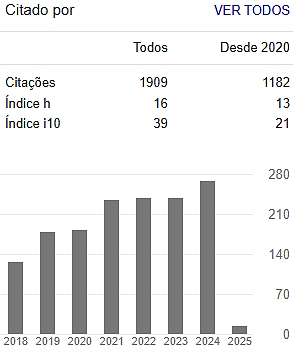GÊNERO E SOCIEDADE: EXPLICAÇÕES DE SUAS RELAÇÕES E EFEITOS EDUCACIONAIS
Keywords:
Gender, Thought, Education, Family, SchoolAbstract
This article works on Vygotsky’s (1987) conceptions of the relationship between thought
and language from a perspective of influence on cognitive development and the formation of the
view on gender proposed by the school. In this sense, we also noted the construction of stereotypes
understood by Brunneli (2016) as major influences on social behavior and discourse, relating, from
this perspective, and being able to explain actions and interactions that are studied by social
psychology. Nevertheless, the studies of Cunha and Góes (2002), Xavier, Ribeiro and Noronha (1994)
were used to understand how the formation of these stereotypes that were disseminated influenced
the educational organization and cooperated to maintain the status quo, that is, inequality and its
justifications. Also, to understand the new questions that arise about sexuality, it was necessary to
analyze the studies of Louro (1997) and Oliveira e Santos (2012) to understand these new dynamics
and perspectives that arise to think about a school concerned with the present, leaving aside your
worries about yesterday. Therefore, it was perceived how these relations coexisted and fostered a
social organization based on a purpose not only to justify hierarchical power relations, but also to
maintain them using strategic sectors such as education and, consequently, the school.
Downloads
References
BRUNELLI, A. F. Estereótipos e desigualdades sociais: contribuições da psicologia social à análise do
discurso. Cadernos de Estudos Linguísticos, Campinas, SP, v. 58, n. 1, p. 25–43, 2016. DOI:
20396/cel.v58i1.8646152. Disponível em:
https://periodicos.sbu.unicamp.br/ojs/index.php/cel/article/view/8646152. Acesso em: 4 jul. 2021.
CUNHA, L. A.; GÓES, M. O golpe na educação. 11. ed. Rio de Janeiro: Jorge Zahar Ed., 2002. p. 35-87.
FINCO, Daniela. Faca sem ponta, galinha sem pé, homem com homem, mulher com mulher:
relações de gênero nas brincadeiras de meninos e meninas na pré-escola. 2004. 171 p. Dissertação
(mestrado) - Universidade Estadual de Campinas, Faculdade de Educação, Campinas, SP. Disponível
em: <http://www.repositorio.unicamp.br/handle/REPOSIP/252827>. Acesso em: 16 maio 2021, p. 1-
LIBÂNEO, J. C. Didática.2. ed. São Paulo: Cortez, 2013.
LOURO, G. L. Gênero, sexualidade e educação. Uma perspectiva pós-estruturalista. Petrópolis, RJ:
Vozes, 1997.
Lucci, Marcos A. . A Proposta de Vygotsky: A Psicologia Sócio Histórica. Profesorado (Granada), v. 10,
p. 01-10, 2006.
OLIVEIRA, T. R. M. DE; SANTOS, C. Novos mapas de (trans) sexualidade e de gênero: pistas para
pensar políticas trans e práticas pedagógicas. Revista Cronos, v. 11, n. 2, 28 nov. 2012.
RIBEIRO, M. L. S. História da educação brasileira: a organização escolar. 12. ed. São Paulo: Cortez:
Autores Associados, 1992. (Coleção educação contemporânea).
VYGOTSKY, L. S. Pensamento e linguagem. 1ª edição. São Paulo: Martins Fontes, 1987.
____________. Imaginação e criação na infância. (A. M. B. Smolka, Trad.). São Paulo: Ática, 2009.
XAVIER, M. E. S. P.; RIBEIRO, M. L. S.; NORONHA, O. M. História da educação: a escola no Brasil. São
Paulo: FTD, 1994. p. 102-121.

